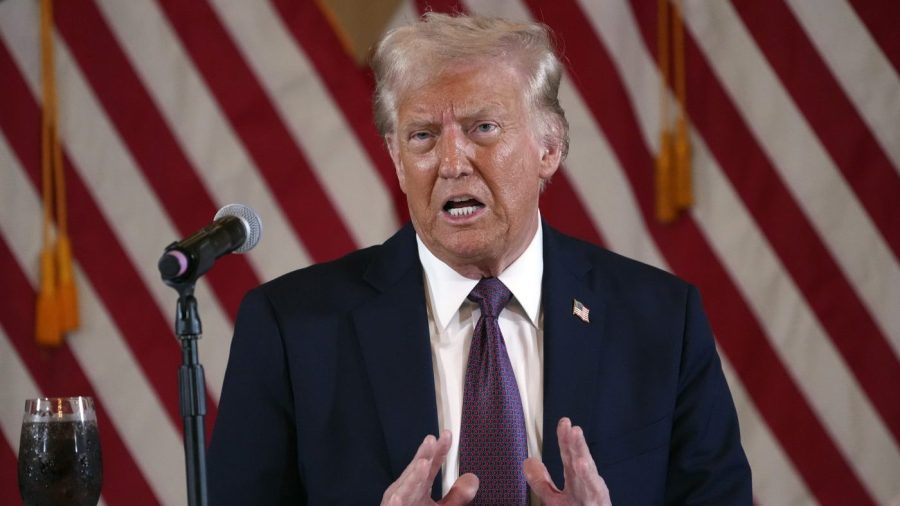
It does not require the acuity of a Kissinger or an Acheson to grasp that the international rules-based order is in desperately poor health. The impending second presidency of Donald Trump is a challenge to the framework of global politics and diplomacy that it may not survive.
As he approaches another term, Trump has already raised some startling notions. Before Christmas, he suggested Canada should become the 51st of the United States; called the Panama Canal a “vital national asset” and said that unless fees for its use were lowered he would “demand” that it “be returned to us, in full, quickly and without question”; and announced that “the ownership and control of Greenland is an absolute necessity” for the national security of the U.S., reviving a 2019 proposal to buy it from Denmark.
This is not so much old-fashioned power politics so much as antediluvian, an approach to territorial claims and sovereignty that was supposed to have ended in the aftermath of World War II and the signing of the U.N. Charter in 1945.
During the Cold War, international relations were framed by the global competition between East and West. But that competition was regulated, and conducted in acknowledgment of the existence of the U.N., the International Court of Justice, the World Bank and the International Monetary Fund — which emerged from the Bretton Woods agreements — and the General Agreement on Tariffs and Trade.
The rules and decisions of these bodies might not always be recognized, but it was a world of multilateralism and an attempt, however imperfect, to replicate internationally the governing structures of a democratic nation state: law and order, justice and economic freedom. The end of the Cold War seemed to make these institutions more attractive, as the World Trade Organization succeeded GATT in 1995 and the International Criminal Court was established in 1998 (albeit without the ratification of the U.S., Russia and Israel or the participation of China, India, Pakistan and Turkey, among others).
It has not turned out that way. Russia’s war of conquest against Ukraine, China’s growing assertiveness in international waters, the recurring maelstrom of the Middle East, piracy and terrorism around the Horn of Africa: all have confounded the rules-based order. Should we contemplate the possibility that Trump is merely the instrument of its euthanasia?
I wrote last year that the U.N. is “failing everywhere … an ineffective organization that teeters on the brink of irrelevance.” The reason for this is existential and fundamental, as the U.N. is “founded on a fallacy — that all nations are equal and have equal moral weight and integrity.” That may be a rare point on which my views coincide with Trump’s, but there is also truth in the idea that, currently, the U.N. is the best thing we have.
The various post-WWII multilateral organizations that span the globe are imperfect and occasionally noxious. They nevertheless represent an attempt to regulate interactions between states and provide some concept of rules and mitigate the ancient human impulse that “might is right.”
The imminent Trump administration simply does not believe in that attempt, that impulse. It is widely expected that Washington will substantially reduce its funding to the U.N., as it did in Trump’s first term. Karoline Leavitt, who will soon be White House press secretary, has said explicitly that “President Trump will restore world peace through American strength.”
In terms of global finance, Trump’s nominee for secretary of the Treasury, investor and hedge fund manager Scott Bessett, said last November that “we’re in the midst … of a Bretton Woods realignment coming in terms of global policy … I’d like to be part of it.” That means the World Bank, of which the U.S. is the largest shareholder, and the IMF, to which the U.S. is the biggest contributor, are in play; while Trump’s idolization of tariffs puts him at odds with the very purpose of the WTO.
The idea of Trump tearing down the rules-based order, upending the framework of multilateral institutions like Jesus chasing the moneychangers out of the Temple in Jerusalem, thrills his MAGA followers. It is not without merit: The U.N. is a perversion of the institution it was intended to be, the International Court of Justice rages toothlessly but often with political bias and the IMF favors politics over economics.
If these institutions are simply cast aside, the U.S. will, for now, retain its hegemonic position. It is the world’s largest economy — bigger than China, Japan and Germany, its closest competitors, put together — and spends more on defense than the next four countries combined. Where might is right, the U.S. is mightiest of all.
That may not always be so. If the American economy falters, or its military power is matched or eclipsed, Trump may have placed the country for which he espouses such love in a world where there are no longer rules or safeguards for anyone.
The president-elect is not a known fan of writer and politician Hilaire Belloc, but he should remember the fate of the eponymous boy in the poem, “Jim” — he ran away from his nurse’s care, and was eaten by a lion. Jim’s father warned the other children to “attend / To James’s miserable end / And always keep a-hold of Nurse / For fear of finding something worse.”
Eliot Wilson is a freelance writer on politics and international affairs and the co-founder of Pivot Point Group. He was senior official in the U.K. House of Commons from 2005 to 2016, including serving as a clerk of the Defence Committee and secretary of the U.K. delegation to the NATO Parliamentary Assembly.












